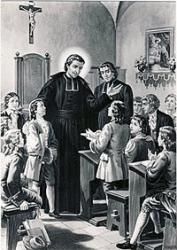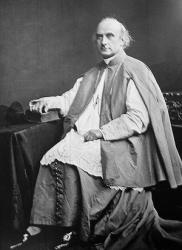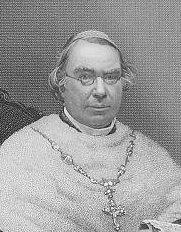
1673 - 1716 Person Name: Louis Marie Grignon Hymnal Number: d145 Author of "I nothing fear with Jesus at my side" in Diocesan Hymnal Grignon, Louis Marie, son of J. B. Grignon, Sieur de la Bacheleraie, was born Jan. 31, 1673, at Montfort, near Rennes, and is generally known as Grignon de Montfort, or as de Montfort. He was ordained priest in 1700, and devoted himself principally to conducting missions and retreats, after 1711 in the diocese of La Rochelle. He died April 28, 1716, at Saint-Laurent-sur-Sevre, Vendee. In 1833 he was decreed the Venerable, in 1870 advanced to the grade of the Blessed, but has not yet been formally canonised. His hymns were collected as Cantiques des Missions composes par Louis-Marie Grignon de Montfort, Poitiers, 1763, the most complete and authentic ed. being that of Poitiers, 1865. The two best known in English are:—
1. Benissons a jamais. [Thanksgiving.] 1865, as above, p. 137; in the Abbé Saurin's Recueil de Prieres et de Cantiques, 1906, No. 49, &c.; translated as: —
Praise we our God with joy. In the Holy Family Hymns, 1860, No. 3, marked as a translation contributed by the Very Rev. Canon Oakeley. It is repeated in Hymns for the Year, 1867, Church Hymns, 1903, No. 535, and others.
2. Le monde en vain, par ses biens et ses charmes. [Trust in Jesus.] 1865, p. 42; in Saurin, 1906, No. 115 ; in the Cantiques Spirituels, Chartres, 1774, No. 50, &c.; translated as: —
To win my heart with visions bright and fair. In the Holy Family Hymns, 1860, No. 85, marked as a tr. by Right Rev. Mgr. Manning. Repeated in the Arundel Hymns, 1902, No. 145.
Two others are translated in the Parochial Hymn Book, 1880:—
3. A la mort, a la mort. [On Death.] 1865, p. 69; Saurin, 1906, No. 43, &c.; translated as:—
On to death, on to death. Previously in the Holy Family Hymns, 1860, No. 94, as by F. R.
4. Dieu va dej loyer sa puissance. [Day of Judgment.] 1865, p. 78; Saurin, 1906, No. 45; Cantiques Spirituels, Chartres, 1774, No. 77; translated as:—
God now prepares to show His might. By K. D. Best. In his own Priest's Poems, 1900, p. 66, it begins “The Lord prepares." [Rev. James Mearns, M. A.]
--John Julian, Dictionary of Hymnology, New Supplement (1907)
St. Louis-Marie Grignion de Montfort


 My Starred Hymns
My Starred Hymns





